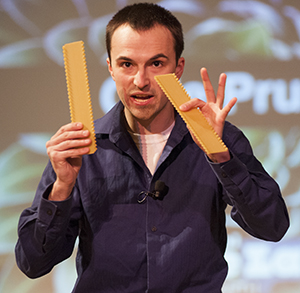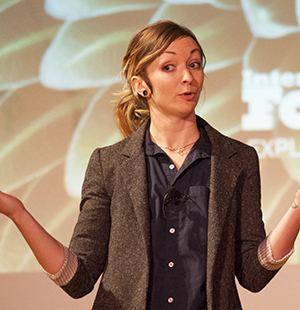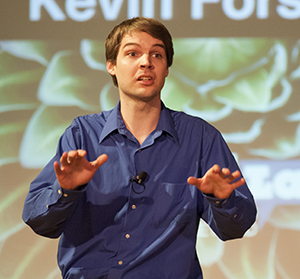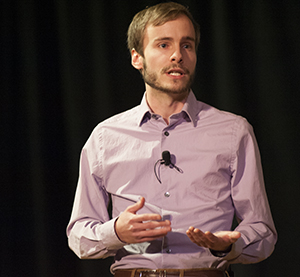Joseph Orkin’s winning Famelab presentation.
When scientists at a party are asked what they do for a living, their answers are often greeted with blank stares and followed by an uncomfortable silence. One lunar scientist tired of making nonscientists feel uncomfortable, just tells them he “contemplates the moon.” After a pause, he then says, “Well, somebody has to do it!.”
The frustration of the scientists is understandable and so is the dismay of their nonscientist interlocutors. After all articles in science journals these days have titles like “The R882H DNMT3A Mutation Associated with AML Dominantly Inhibits WT DNMT3A by Blocking its Ability to Form Active Tetramers.” That’s terrifying stuff, if you can’t decode any of it.
Scientists, especially young ones, don’t accept this standoff and are trying to figure out how to get back in touch with the American public. One testing ground for their skill is FameLab, a science communications competition sponsored by National Geographic and NASA that was recently held at Washington University in St. Louis.
Participants craft a three-minute talk on their research or a related topic, which is then critiqued in a rehearsal for the competition, where 10 finalists give their talks in public.
Joseph Orkin, a graduate studcnt in anthropology won both the “audience’s choice” and “judge’s choice” awards at the St. Louis FameLab, advancing to the national competition. Amanda Melin, PhD, assistant professor of anthropology, wone a “wild card” award and also advances to the finals.
What the judges said about science communication
Only people with nerves of steel volunteer for this event. Keynote speaker and evolutionary anthropologist Kenny Broad, PhD, who cave-dives for science and, not incidentally, also studies how we misjudge risk, told the audience that people rate public speaking as the scariest of all scary things. Second on the list is death.

To be successful in this forum — on stage and above the audience — the contestants have to be actors as well as scientists. Think Bill Nye the Science Guy or Neil deGrasse Tyson, narrator of the remake of “Cosmos.”
So during the rehearsals, some of the judges’ tips were directed at the quality of voice acting. “Vary the cadence,” presenters were told. “It will make you sound less scripted.” “Don’t end sentences with a dying fall, which betrays that you’re already thinking about the sentence to come. ”
But most of the feedback was directed at the central difficulty of communicating science to the public: How do you describe in three minutes something it took you years to understand?

Well, first off, the judges made it abundantly clear, you can’t use the vocabulary of science. Don’t say “selective advantage.” Forget “heterozygous.” Discard “alleles,” and abandon “reproductive success.” One judge, the Simon Cowell of the three, even asked, “Are you sure people know chimpanzees live in Africa? Or, for that matter, where Africa is?”
The judges also were very tough on the ‘So what?’ question. ‘Why should people care how elements are made in supernova explosions, or why pulsars suddenly speed up instead of slowing down?’ they asked. By the way, what is a “pulsar” when it’s at home?

The reminder is always useful, though some things, including supernova explosions and pulsars, are interesting in and of themselves. As Neil deGrasse Tyson once said, “I know that the molecules in my body are traceable to phenomena in the cosmos. That makes me want to grab people on the street and say: ‘Have you HEARD THIS?”
What’s so special about science?
Scientists have been bothered by the lack of public understanding of science for a long time now — at least since the Sputnik era ran out of gas in the mid-1980s and the shine fell off Newton’s apple.
Annoyed members of the public sometimes ask, “What’s so special about science?” After all, nobody understands what lawyers or mechanics do either.

Although it may be dangerous to say so out loud, many scientists would claim exceptionalism for science. Science pervades our society, they would say. Our prosperity and our health are based on it. Science is entwined with many, if not most, policy issues of national and international importance and a wide range of personal activities. The world can tolerate a few people who believe impossible things, but once there are too many, we begin to make bad collective decisions, ones that eventually bump up hard against the laws of the universe.
Worries about public understanding of science aren’t new; what’s new is scientists’ recognition that they must do a better job of communicating with the public.
In 2009, the Pew Research Center for the People & the Press polled Americans about their views of science and polled scientists about their views of Americans. They found that while Americans tend to have positive views of the scientific community, scientists tend to consider the public ignorant (and the media irresponsible).
Or, as a pamphlet summarizing recent American Academy of Arts & Sciences workshops on science communication put it: “The problem is not that the public needs to understand more science but rather that scientists need to understand more public.”
That’s what FameLab is all about.